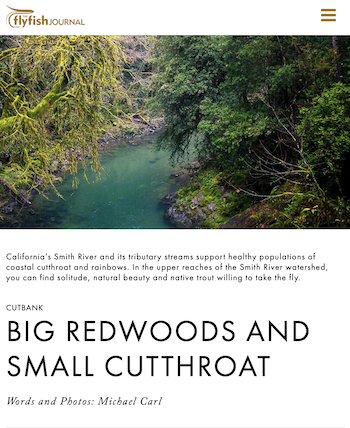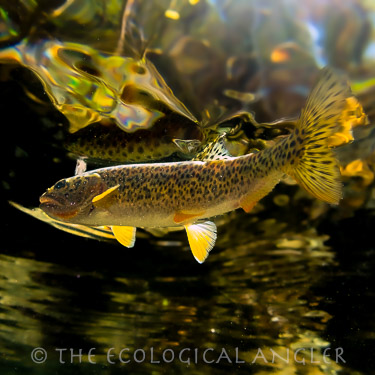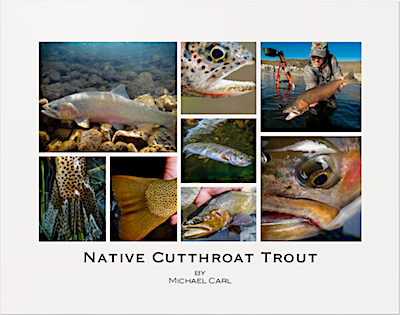The Flyfish Journal Summer 2024
 Searching for a place to fish, I found refuge from the summer heat along the Redwood Coast. More importantly, I realized how an old-growth forest is the perfect home for cold-water loving fish.
Searching for a place to fish, I found refuge from the summer heat along the Redwood Coast. More importantly, I realized how an old-growth forest is the perfect home for cold-water loving fish.
Read my story in Volume 15, Issue 4 of The FlyFish Journal.
Coastal Sea-Run Cutthroat Trout

Coastal cutthroat trout,Oncorhynchus clarkii clarkii, reside in the coastal streams of North America from the Eel River in northern California to south central Alaska. These native trout prefer small coastal streams, rivers, and lakes and are closely associated with the temperate rain forests of the Pacific Northwest.
Of all the subspecies of cutthroat trout in North America, they are the only one's with an anadromouslife history. They exhibit complex life history that includes resident, river migrant, lake migrant, and marine migrant forms. Coastal cutts, sometimes referred to as “sea-runs” can be found in the estuaries and lagoon systems of northern California. Coastal cutthroat trout spawn in small headwater streams, typically above the spawning grounds of other Pacific salmon.
Heavy black spotting and yellow to red slashes of pigment under the lower jaw are defining features of Cutthroat trout. Spots are also frequently present on the anal and paired fins. The body spotting becomes nearly invisible when these fish migrate to and from sea.
Their basibranchial teeth can be easily felt with a finger. Similar to rainbow trout in overall body color, but coastal cutthroat trout spotting is heavier particularly below the lateral line and on the posterior half of the body.
Preferred Habitat
Coastal cutthroat trout live in cool, clean water with overhead cover and deep pools for holding in the warm months of summer. They prefer small, low gradient coastal streams and estuarine lagoons. Adults overwintering in streams, rather than estuaries, prefer pools with fallen logs or undercut banks but will also utilize boulders, depth, and turbulence as alternative forms of cover if woody debris is not available (Gerstung 1998, Rosenfeld et al. 2000, Rosenfeld and Boss 2001). Optimal stream temperatures are less than 18°C, with preferred temperatures being around 9-12°C. This may explain why they occur mainly in more northern streams in California, within the cooler coastal fog belt.

